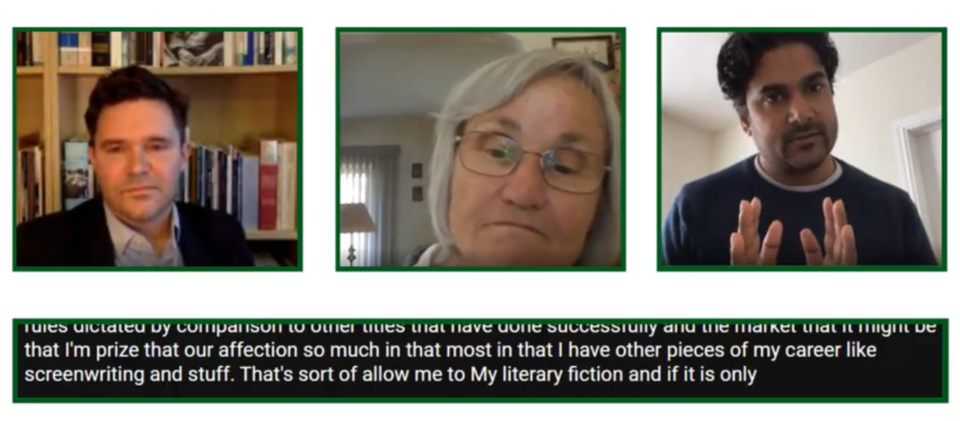The Lunch Is Lit noon-hour series concluded today with readings from two more guest authors, followed by another enthusiastic question and answer period.
Naben Ruthnum, pen-name Nathan Ripley, first shared a short essay about the villain from his latest novel Your Life Is Mine, followed by a reading from the novel itself.
Steven Price read a selection from his most recent book Lampedusa, which was shortlisted for the 2019 Giller Prize.
During the question period with the live chat, audience members were curious about the behind-the-scenes processes that helped Ruthnum and Price shape their respective novels.
Price spoke about his deep curiosity about Italian novel The Leopard and it's author Giuseppe Tomasi di Lampedusa, the subject of Price’s novel Lampedusa, and how part of his late-stage research included a trip to Palermo, Sicily and a stay at the palazzo that Tomasi lived in near the end of his life.
Setting, said Price, was important as he was working from a real story based in real places, but he also felt as though his setting was very reliant on mood and atmosphere moreso than physical description alone.
“I think setting comes from point of view, so for me when I’m describing a place or have characters moving through a space, I’m tryin to think about the characters themselves,” said Price. “Things are coloured by the mood that the character is experiencing [and] I would say I lean pretty heavily on the five senses when describing things.”
As an author writing about a setting that takes place in the past and, in some cases, doesn’t exist anymore, Price felt like it was an interesting challenge to recreate setting in that way.
“When I was promoting [my previous novel] Gaslight, I used to talk about how it’s set in the nineteenth century in Victorian London, and how I was writing about a place that doesn’t exist anymore,” he continued. “It's been heavily documented but it's gone, and there’s no way [to know the experience] of walking down a particular street.”
For Ruthnum, he began to approach psychological thriller as a genre thanks to an interest in writing a true crime-esque story for a different audience.
“The cue to my first book, in some ways, came from being a bit distressed by certain kinds of true crime books that I’d read and wondering what the audience was for them, those 80s and 90s ones that sort of focused on violence and particularly violence against women,” said Ruthnum. “I had no interest in how they were depicting the stories [and] so actually writing my story was a way to process and handle that.”
Ruthnum also shared what prompted him to write under both his own name as well as a pseudonym — which had a simple and a complicated answer, he admitted.
“I get this question a lot and I love answering it, because my greatest worry is that people think I’m hiding and concealing my race, which is the last thing I’m doing,” said Ruthnum.
The easy answer, he continued, was that he wanted to work under a pseudonym to separate the types of literature he was interested in writing in his career, both “big brilliant literary novels” and more pop culture inspired fiction.
“[The complicated side] is that as I went through my career, I was sort of wrestling with how I felt that the publishing industry had an expectation that someone with a name like mine was going to write a particular kind of book,” he continued. “There’s a long rich tradition of South Asian diasporic literature that looks at a past rooted in family, food, experience and nostalgia [and] that wasn’t the books I wanted to write so I discovered that having this other name, I was at least approaching readers, editors, agents from a place of relative anonymity.”
The Festival of Words continues until July 19, with a full schedule of events available here.
Stay tuned for coverage of the festival as it progresses through the week.




